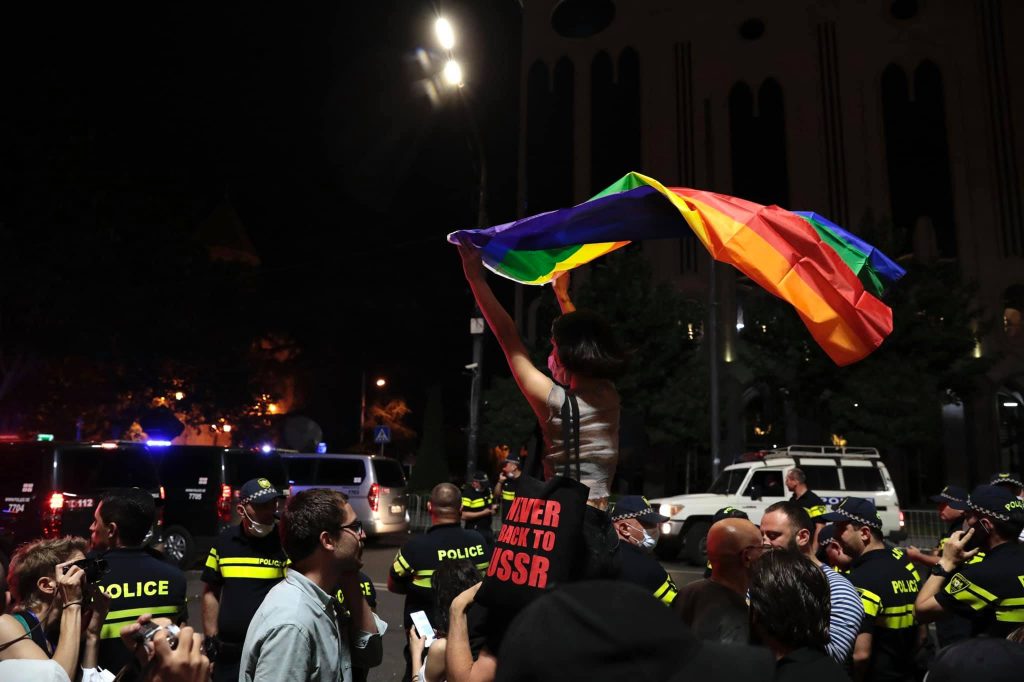Despite attempts by far-right, Russia-friendly groups to disrupt the events, Tbilisi Pride Week ended safely with a queer festival uphill in Mtatsminda Park on July 2-3.
A year ago, on July 5, more than 50 journalists and activists were violently assaulted by far-right mobs in 2021 ahead of the planned Pride March. This year, the organizers, Tbilisi Pride activist group, refrained from public events due to safety concerns and opted for an indoor movie screening, a regional conference, and a festival instead.
“Even though we are not going into the streets, which is really sad, we found some ways to unite, empower each other, to exchange experiences, and to support each other,” Mariam Kvaratskhelia, Tbilisi Pride co-director told Civil.ge.
Kvaratskhelia explains the importance of “a platform where many people including allies and also the broader public can have a discussion about homophobia [and] LGBTQ equality.” She says that after the “traumatic and difficult experience” of last year’s homophobic pogroms there was “no space and opportunity for us to organize street action, march, or a rally.”
The organizers were also mindful of the international context. As Georgia has an opportunity of becoming the EU candidate country, if it fulfills the reforms set out by the European Commission, Kvaratskhelia says they “really wanted to avoid any possibility of creating the tension in the city and [of a] scandal in order not to compromise our European future.”
“Queers as always, we made a very responsible decision, a kind of compromise, and decided to organize closed events this year,” Kvaratskhelia tells us, “but these events are quite big, impressive, and important for the queer community and its allies.”
Far Right Groups Rally Against Festival
Few thousand led by the pro-Russian Alt-Info group rallied against the festival on July 2 in front of the Georgian Parliament, pointedly burning LGBT, NATO, and EU flags there. A night before, 26 were arrested by police, including one of its leaders Zurab Makharadze and prominent member Irakli Martinenko, for disorderly conduct and non-compliance with lawful police orders (Articles 166, 173) as they rallied against festival preparations.
Later during the day, the group moved to ruling Georgian Dream party headquarters. Upset at the police crackdown at their leadership the evening before, they threw the desecrated flags at the building. Next stop – the European Union’s office located on lavish Ilia Chavchavadze Avenue.
“This is a day of victory for us, since July 5 [2021] made it into the rule that they [Tbilisi Pride] do not even dare to hold the so-called March for Dignity,” Konstantine Morgoshia, the violent movement’s veteran, told his supporters. Denigrating the festival that went ahead “somewhere in the forest” Morgoshia stressed, “the whole world must see that even against that [festival] there is a large protest.”
As the radical groups rallied, 17 were arrested while refusing to comply with police orders when they tried to march towards the festival venue.
Police was heavily visible, accompanying the crowd throughout the day. The day ended without particular incidents, despite the aggressive crowd and their tense attitude towards the media which covered the events.
Georgian Dream, Orthodox Church Stay Silent
Last year, the Georgian Dream government and the Georgian Orthodox Church spoke up in unison against the Tbilisi Pride events. Prime Minister Irakli Garibashvili remarked on the morning of Pride March on July 5, 2021 that the planned demonstration was organized by the “radical opposition” and “unreasonable.”
He went on to linked the Pride March to ex-President Mikheil Saakashvili and his party, the United National Movement, saying they attempt to jointly sow unrest in the nation. The PM’s statements were criticized by activists for adding fuel to the already tense environment.
Following the attacks, PM Garibashvili downplayed the violence and chose to lash out at activists for going against the will of the Georgian population and holding their “propagandistic parade.”
He had also said that while the violence was unfortunate, it happens everywhere including in Europe and the U.S.
The Church, which is one of the most trusted institutions in the country, criticized the planned event beforehand and called on its supporters to organize a counterrally. Following the violent events, it too shifted the blame for the attacks to Pride organizers.
This year, the leadership of both institutions rather stayed mute. Silence, that is insufficient for changing the tone.

